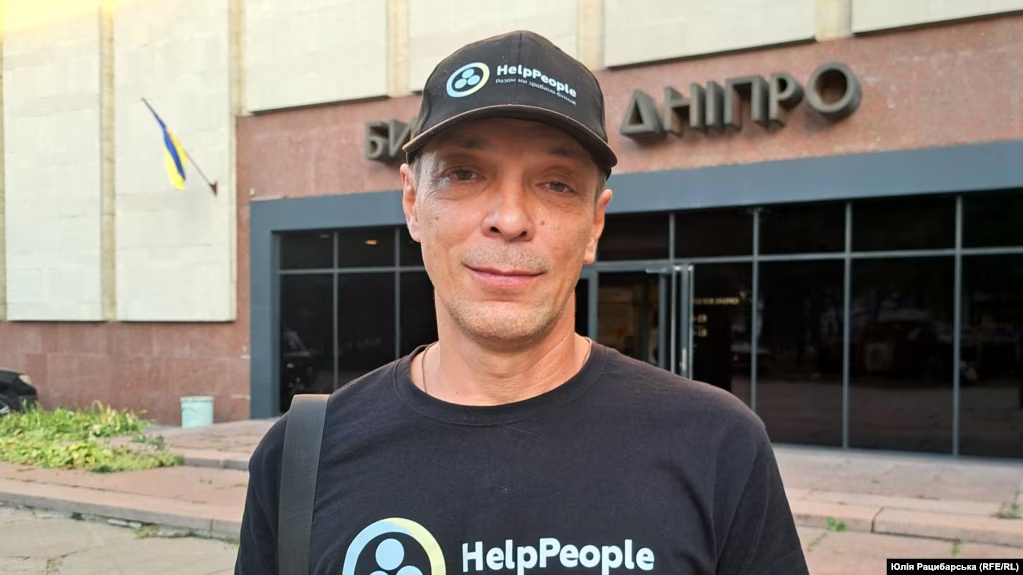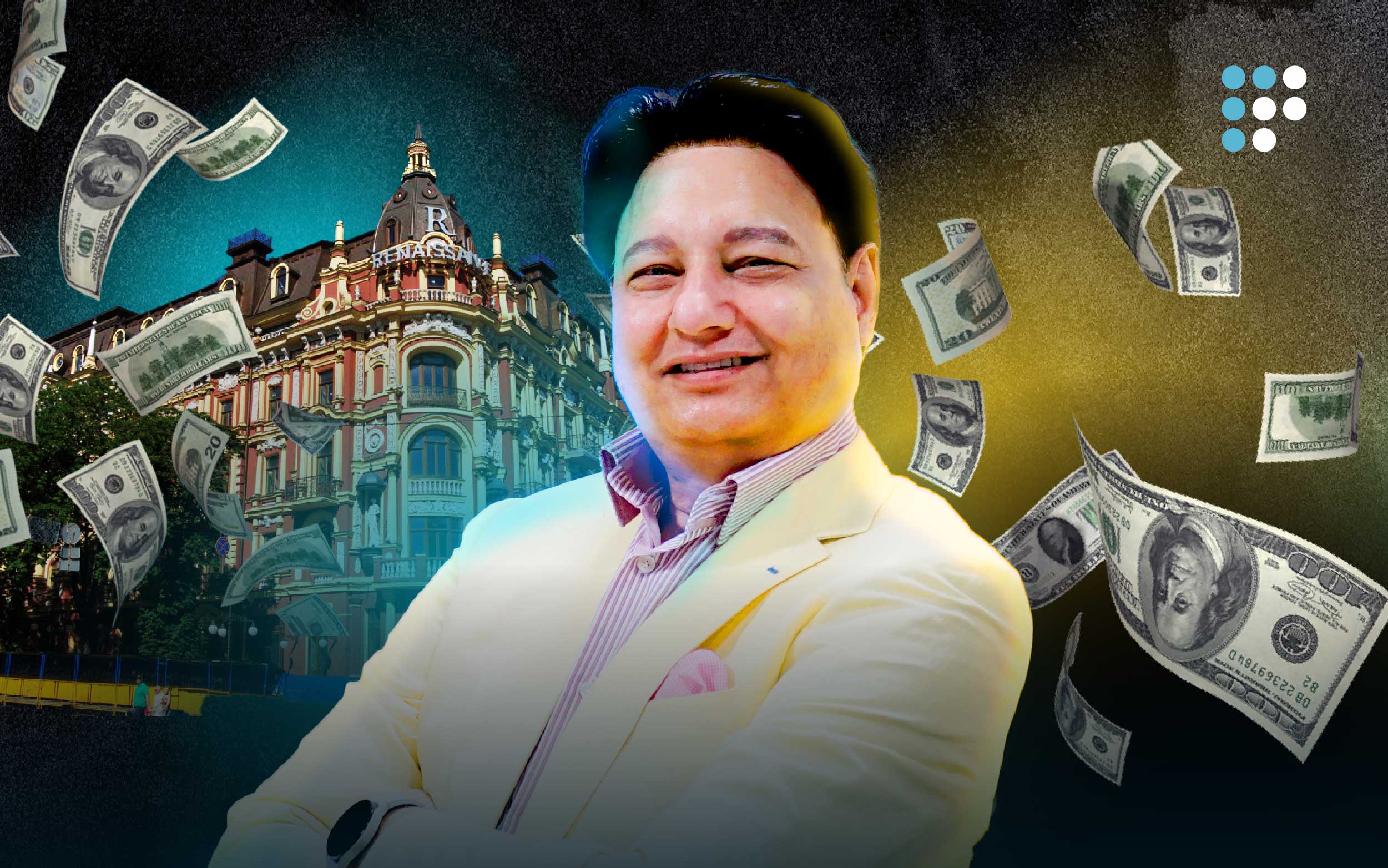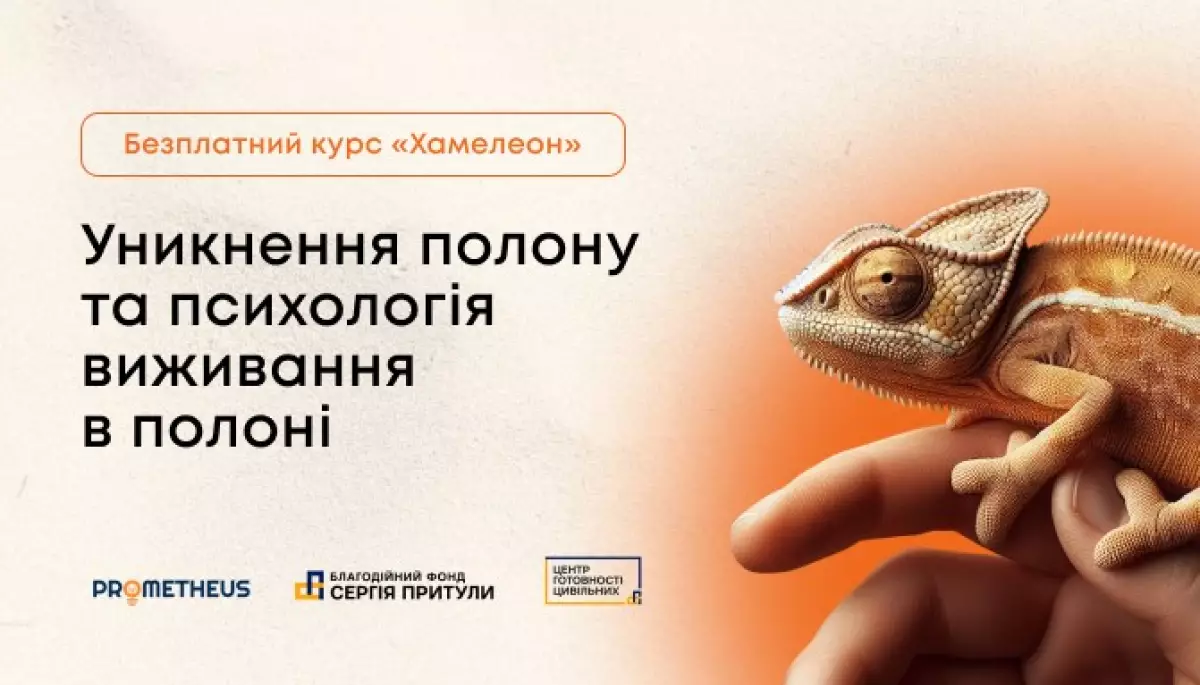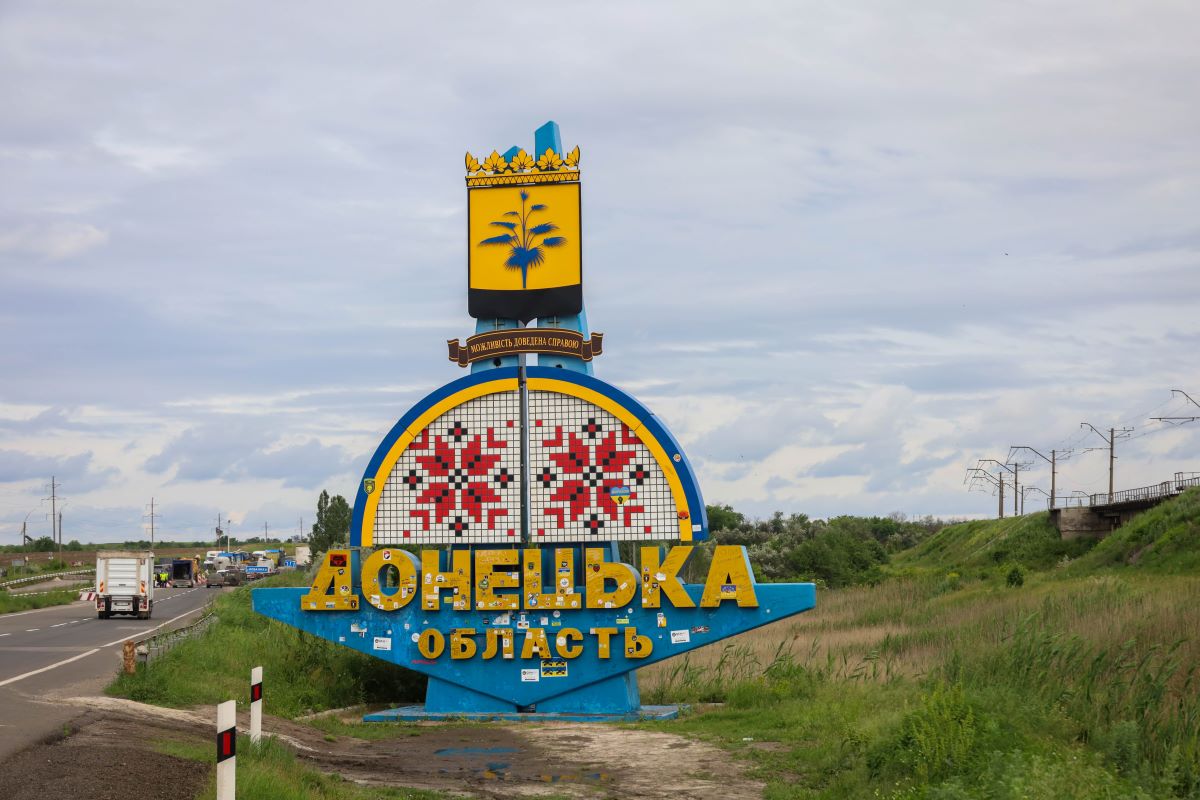
Global Political Analyst Bociurkiw: These Authoritarian Thug Regimes Can Get Away With It
This week’s interview is with global political analyst Michael Bociurkiw. Bohdan Nahaylo talks to Michael on his take on the latest events in Ukraine
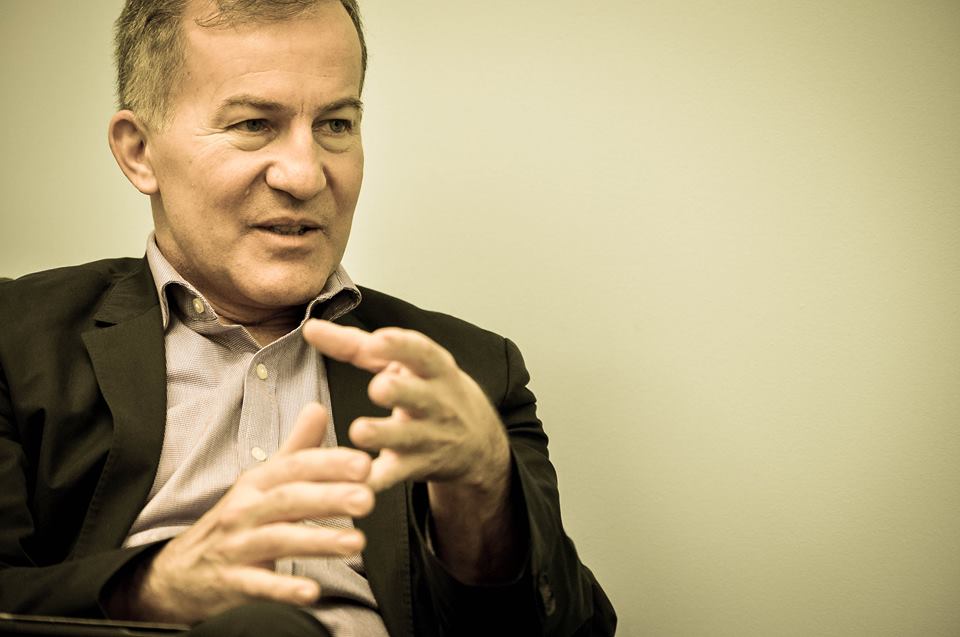
Hello and welcome to this week’s episode of Ukraine Calling. I’m Oksana Smerechuk for Hromadske Radio in Kyiv and we’re bringing you our feature in-depth interview followed by some new music from Ukraine.
This week’s interview is with global political analyst Michael Bociurkiw. Bohdan Nahaylo talks to Michael on his take on the latest events in Ukraine. That will be a little further on, but first of all, this week’s news.
FEATURE INTERVIEW: Global Political Analyst Bociurkiw: These Authoritarian Thug Regimes Can Get Away With It
Nahaylo: I’m very happy to have in our studio for Ukraine Calling Michael Bociurkiw, who’s been a guest on our programme before. Michael is a very well known global affairs analyst, former spokesperson for the OSCE, for the Special Monitoring Mission in Ukraine. He worked also for UNICEF. I congratulate you, Michael, that you have become one of the most prominent spokespersons on these broad-ranging global affairs issues, humanitarian issues, and also issues of concern to Ukrainians. Welcome to the programme!
Bociurkiw: Thank you, good to be here.
Nahaylo: First question, what brings you back to Ukraine again?
Bociurkiw: Well, it’s almost a tradition for me to come to Ukraine at this time of year. It so happens that on Friday, this Friday is the annual awards ceremony that was initiated by my late dear aunt Anastasia Shal’nyk, from Canada. It’s called Світло Справедливості [The Light of Fairness]. It’s an award for ethical, moral, spiritual leadership. Past awardees have included Yevhen Sverstiuk [former Soviet dissident], Mustafa Dzemilev [Crimean Tatar leader]. Last year a dear friend of mine received the award, Natalia Sedletska [investigative journalist] from the show Skhemy [Schemes]. And, of course, it so happens we now find ourselves in a very uncertain time for journalists, not only here in Ukraine, but world wide. So, we’re all thinking about Sedletska and her team. They do terrific work. And, also, I was here attending the Tiger Conference, as a speaker last year, just a participant this year. And very interesting Bohdan because a few things came up this year. One thing was high tech. It’s kind of the new darling, or star of the Ukrainian economy, creating tons of jobs.
Nahaylo: And everybody seems to be talking about it
Bociurkiw: Everyone is! Including last night, where I saw you at the British-Ukrainian Chamber of Commerce. It’s great to see this bright light in the Ukrainian economy, which otherwise is not doing very well. Not being helped by Martial Law, I might add. We talked earlier about some of the changes that I’ve seen in Ukraine, and the Tiger Conference, it wound up with the annual Top 30 Under 30 Awards.
Nahaylo: Just to remind listeners, the Tiger Conference is run by the Kyiv Post.
Bociurkiw: Correct.
Nahaylo: It’s an annual event that brings together some of the top speakers and experts in various areas. But it also gives prizes to 30 of the most successful under 30 people in this country.
Bociurkiw: Correct. And during the awards ceremony, about 3 or four of the young kids, of course they’re all under 30, rejected the award, on the basis that it was sponsored by Victor Pinchuk, one of Ukraine’s richest oligarchs. In discussions afterwards with participants we were wondering, these are young folks, are we seeing the beginning of a kind of an anti-oligarch mentality here in Ukraine?
Nahaylo: Well, I think we’ve been seeing that for a long time, the Maidan was about that. It’s just that it hasn’t jelled together properly. It was interesting, I was also present, as you noted, that these protests, if you want, the refusal to take a prize from an oligarch, even if well meaning, it was done in his presence.
Bociurkiw: It was. And I think that will stick with him. He’s one of the more visible oligarchs of the half dozen or so that are still running around here in Ukraine. He does the annual YES Conference which is very visible. But this reminds us that there are such disparities in the Ukrainian economy. You have people struggling to make $100 – 200 a month. And then you have these rich billionaires. In fairness to him, it’s good to see that part of his fortune, if you will, goes to these types of events which reward young entrepreneurship.
Nahaylo: And who impressed you the most, of the young people?
Bociurkiw: Well, I think all of them have some really good stuff going for them. And also, there was a book ceremony where one of the young ladies, 17 years old, I believe, declared: “I’m going to become President of Ukraine!” Well, that is not something you hear every day, especially from young people. So, that was good to see. She actually had a platform to present. That was a bright light. Also, I should add that one of the panelists who very impressed me was the Deputy Mayor of Dnipro city. She also advises, I believe, the Mayor of L’viv, and others. She’s half-Estonian and half-Ukrainian, she was very articulate, very energetic. And just quickly I went up to her and introduced myself and asked if she had any aspirations to go into national politics. And she said, no! I’m happy where I am in municipal politics because that’s where my decisions affect people most directly.
Nahaylo: Michael, you have been very active outside of Ukraine, and in fact one of your recent pieces was about the introduction of Martial Law here [in Ukraine] in response to Russia’s aggression in the Kerch Strait. What were you saying, basically? Remind us.
Bociurkiw: Well, I wrote quite a hard-hitting piece for CNN opinion, and then I did an interview with Rosemary Church on CNN International. And I didn’t hold back at all. I thought, you know, that the timing was terrible. I thought the timing was also suspicious, coming so soon before the Presidential election [scheduled for 31 March 2019]. But one also wonders, and believe me, this is not only my opinion, I’ve talked to many local Ukrainian friends here, why wasn’t Martial Law introduced in 2014? When eastern Ukraine was taken over, when Crimea? Or during some of the other high points of the conflict. But look, we have been talking a lot this week about the economy, investment, and this is just the worst thing that could be introduced right now for the Ukrainian economy. In fact, I understand the government roadshow that was supposed to happen this week in Berlin was cancelled. You know, who is going to invest in a country where they have Martial Law? What kind of tourists are going to come to a Martial Law environment? So, I’m not quite sure whether they calculated all of this.
Nahaylo: You are on top of these subjects, but one thing that I have observed is that this slow, gradual strangulation of the Sea of Azov has been going on for almost half a year. And I’ve been rather disappointed and surprised by the very weak responses of official Kyiv to this. Suddenly, there’s this great reaction to the boats being seized, and sailors being taken prisoners of war. But why wasn’t there a very active campaign to alert the West to what was happening?
Bociurkiw: One wonders. One wonders indeed. And why has it taken so long to build up the capacity of the Ukrainian Navy as well. I noted in my CNN pieces that it took quite some time for Poroshenko to accept these naval boats that were donated by the United States. That would have boosted capacity of the forces there. Look, I’m not going to gloss this over whatsoever. It’s clear what is happening in that part of the world, in the Azov Sea, with the construction of the bridge, the strangulation of the Ukrainian economy there, that Putin is intent on taking over that sea. Which, by the way, is the size of Switzerland. It’s huge. But it’s in a very strategic location
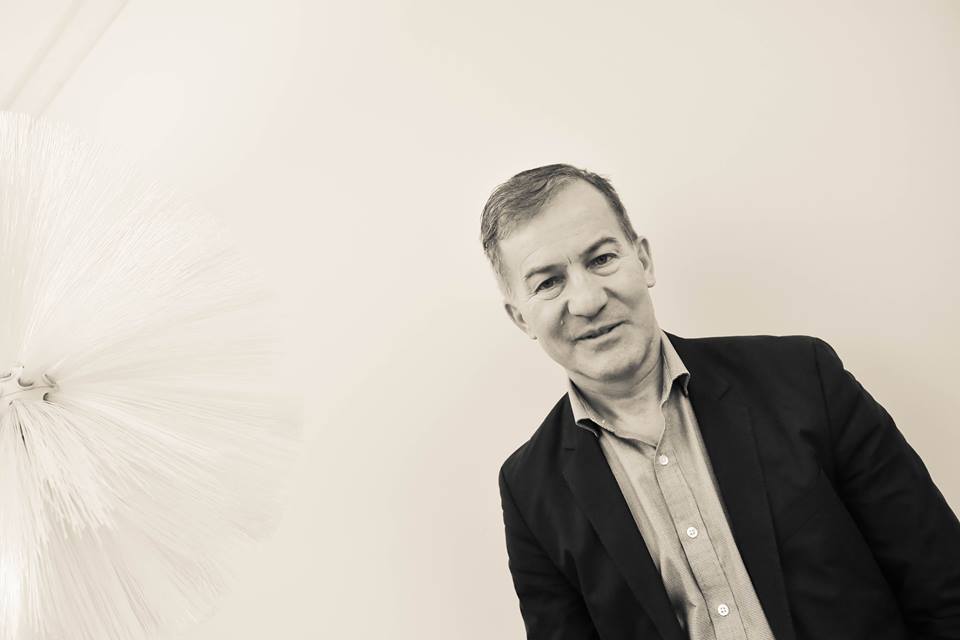
Nahaylo: And perhaps as people have been speculating for a long time, and political analysts warning, that he wants this land corridor to Crimea, to supply water supplies to Crimea, but also, more or less to take over, or neutralize the ports of Mariupol and Berdians’k.
Bociurkiw: The reaction of the West has been very muted. Of course, there was a lot of strong rhetoric, including from Chrystia Freeland, my Foreign Affairs Minister in Canada. But those words were not backed up by actions.
But those words weren’t backed up by actions. This is a theme I’ve been talking about and writing about for quite some time, is how thug regimes, authoritarian regimes have been acting very harshly, with abandon I would say. Whether it’s in Saudi Arabia, Turkey, Yemen, in Ukraine, with the Russian’s aggressive actions in Ukraine. And I think people like Putin, like the crown prince of Saudi Arabia, know now that they can act and not suffer severe consequences, so that’s very, very disappointing to see.
Nahaylo: So, Michael, why is that? Are we back in the mid 30’s? In the age of appeasement where you had Mussolini in Abyssinia, Hitler getting away with you know, land grabs. Much going on; Stalin murdering millions in Ukraine. Why do you think, as somebody who covers these affairs closely, why do we have this lack of leadership and lack of backbone in the countries that have been the pillars of democracy, of the Euro-Atlantic structures, etc.?
Bociurkiw: It’s a very complicated situation; but I think a big reason is the collapse of American leadership. The biggest, strongest democracy in the world, traditionally the world’s policeman when it comes to enforcing the words-based rules. It’s very sad to see what’s going on, because although we hear outrage, this morning even from the American embassy towards the Nasirov case, we’ve heard Nikki Haley speak very strongly about the situation in Ukraine, but it’s not backed up by actions. So, I think these authoritarian thug regimes can get away with it. And look what is happening in China right now, in regards to Canada, for example. We recently, at the request of the United States, arrested the CFO of Huawei, the telecoms firm. And China promised retaliation even though things are happening according to the law. And right now, two Canadians have been detained in China, and they are acting the way they want to, without following the law. It’s very disappointing to see.
Nahaylo: What could be done, what should be done by Ukrainians that may be listening, particularly younger Ukrainians, professionals? Both in Ukraine of course but perhaps in the diaspora too, to strengthen the message? We seem to have come a long way since the Orange Revolution, Euromaidan and whatever. We’ve tried to get our act together to get the messages across. But somehow we’re not succeeding; we’re failing.
Bociurkiw: Yes, you know it’s a theme I talked about last year when I was here with Tiger, and elsewhere, is that I think one of the big problems is we have a lack of spokespeople; a lack of advocates, surrogates, whatever you want to call them, speaking on behalf of Ukraine. We’ve talked about this so much in the diaspora, you know, like having prominent actors, or people from Hollywood even taking interest in the Ukraine issue. Because there are Ukrainians there, but even the Ukrainian government does not have its act together whatsoever when it comes to advocacy. And I’ll give you a couple of quick examples. I mean, naming now the spokesperson of the MFA in Ukraine; they lost their previous spokesperson, she was appointed ambassador, and I don’t see anyone speaking on behalf of the Ministry, except the minister himself. And then the other thing, Ukrainian embassies in key capitols –
Nahaylo: And the president doesn’t have a proper spokesperson.
Bociurkiw: No, he doesn’t.
Nahaylo: Like Putin has, with instant responses, tackling the press and having a kind of Michael Bociurkiw for the OSCE, you know, it’s obvious. Is that because the president, as a former foreign minister, is his own foreign minister?
Bociurkiw: Well I think it’s still a very centralized type of structure here in Ukraine, and there’s a lack of trust even in delegating things. I was about to say, is that in our key capitals around the world, Ukrainian embassies are so under-resourced and don’t have proper spokespeople. So that’s a big problem I think in terms of getting our message across. Now, very quickly it has to be said that whenever I can I try and bring up Ukrainian issues in mainstream media. I am blessed to have this incredible platform, but I am finding it quite a struggle to get Ukraine on that news agenda.
Nahaylo: But you also have to be very balanced. Your reputation’s at stake; you’re a Canadian, you’re a professional, you’ve been linked, as I said, to the UN, to the OSCE – you can’t simply come across as an apologist for Ukraine. Particularly at a time when, for example, look at what’s been happening in the last 2 or 3 days with the Nasirov case; Nasirov being freed shall we say effectively by a court. And then the MP Leshchenko and the head of NABU being ruled to have acted illegally to have shared information about Manafort’s obtaining money from the secret slush fund that the region’s party had. I mean, that’s not good news for the outside world.
Bociurkiw: No, and let’s just remind people what a crook Nasirov is, the former head of the state fiscal service, accused of embezzling 70 million dollars. And the case was pretty water tight –
Nahaylo: That’s almost as much as Manafort got.
Bociurkiw: There you go. The case was pretty water tight and viewed as a kind of win for the anti-corruption forces here in Ukraine. And a court has reinstated him with back pay, believe it or not.
Nahaylo: So, Michael, imagine you’re on CNN, or on BBC, and I’m saying Mr. Bociurkiw, what does this mean? Does this mean that only lip service is paid to the struggle against corruption? And why would the President afford such a risky political move through his influence on the eve of elections? Does it mean he’s not taking the elections seriously?
Bociurkiw: Well one wonders how independent he really is. If he were to back up the promises he made on the stage at Maidan, where he kind of came to power, he would really go after these crooks, these thugs who have, you know, stolen millions if not billions of dollars from the state treasury. But I don’t think we’ve got to the point that has been demanded by Western donors among others, of an independent judiciary here.
Nahaylo: Many people consider that the tragedy is that the President himself is implicated. We don’t want to go there too much, but there is a view, and it was aired recently by a former minister who was forced to resign, who was close to the president, who described Ukrainian politics and his role, the president’s, as a person balancing interests between other oligarchs and being the premier central power, as opposed to running a nation, being presidential, seeing himself as a historic figure, uniting, speaking for the country, etc.
Bociurkiw: Well look, he does come from the same club if you will, of billionaires who’ve made their fortunes. And you know I mentioned Sedletska on our programme earlier on, and they’ve busted him a couple of times now. One was that secret trip he took to the Maldives, and then the other was property holdings, I believe in Spain, which weren’t properly declared. So, you know, he does kind of appear to be kind of one of these chaps from the Davos elite who is out of touch with the –
Nahaylo: But it’s also toleration of, you know, the links with Firtash that continue, Medvedchuk, you know, being so close to Akhmetov, and balancing with Kolomoyskyi. And how is that to generate confidence both domestically, and to support Ukraine’s image and pleas to the outside world?
Bociurkiw: Yes, well look, Ukraine right now is so reliant on outside donor support from our traditional allies and the multilateral institutions that it has to show, it has to demonstrate that steps are being taken to combat these corrupt schemes.
Nahaylo: Despite everything it’s just getting a tranche from the IMF, it’s just receiving money linked to conditionality from the EU again, a new tranche, so it’s being given the benefit of the doubt, shall we say.
Bociurkiw: It is, and it has to be said that at the end of the day, a lot of this stealing and corrupt schemes actually make matters worse for the common men here in Ukraine that are still struggling. And you know at the Tiger conference we were talking about, this severe, severe brain drain that is happening right now. Ukraine has lost millions of talented people to other economies, and a big reason that they say, because surveys have been done, is because of the corruption, and the day to day struggle of surviving or putting up a business here, going through all that red tape. So if the young people don’t have faith in the economy and the future of Ukraine, that does really worry me.
Nahaylo: Yes, you know the problem is it’s not just the brain drain. Somebody was telling my wife yesterday about the shortage of engineers in this country now. A lot of the skilled labour has left, because they’re getting EUROs abroad or getting better conditions in Poland next door.
Bociurkiw: Well there used to be a joke that the president of Poland could never find a plumber because they’ve all gone to London and they’re working at check-in desks at hotels there. But Yes, there’s a shortage here. In fact, one of the companies declared yesterday that they want to double their staff here in Ukraine, but where are they going to find the talent? Right? So…
Nahaylo: Micheal, looking ahead, do you see any grounds for optimism? A few months down the road, is this election going to be very dirty and disappointing, or do you think that there are potential new forces, new faces that might eventually break out of this strangle hold that the oligarchs have?
Bociurkiw: Yes, well first of all it’s got to be said that the elections coming up at the end of March, presidential elections, are going to be among the most expensive in Europe. There’s so many millions being spent, and in fact, there are already allegations that president Poroshenko is using administrative resources to gain more visibility and popularity.
Nahaylo: Well that was one of the reasons that the minister of finance was forced to resign, it was Danylyuk who said that publicly, that funds are being diverted from the taxation system into giving local barons the money to bribe people locally with.
Bociurkiw: Yes. But you asked if there are any bright lights, I mean of course. Every time I come back here I notice positive changes, whether it’s changes to infrastructure, whether it’s to new services or attractions here in Kyiv. I mean the amount of economic activity here is amazing. It’s still a very, very safe place to come visit; people are very hospitable. But I do worry that despite all of the efforts of the diaspora, of people like UkraineInvest, trying to get folks to come here to Ukraine –
Nahaylo: The great role that Dan Bilak does.
Bociurkiw: Yes exactly. It’s a very tough case to sell this nation branding when we have such corrupt schemes happening here, when you have things like martial law being declared. But you know, look at the end of the day I put my faith in the young kids here.
Nahaylo: That was the hopeful note, very loud, that you emphasized at the Tiger conference. But the diaspora, if there are people listening – the organized diaspora – what should they be doing?
Bociurkiw: Two quick things, and one is actually doing what they have been doing traditionally is lobbying their lawmakers to keep Ukraine very high on the agenda, and to tighten up those sanctions, to make them more targeted. There are other levers available that will squeeze, for example, Putin’s circle in the Kremlin. And then of course it’s very, very important that these issues be elevated in the media. We have a lot of Ukrainians in the media. Of course there’s a lot of other competitive stories out there right now like Brexit, and so on, but it’s very, very important that ordinary people realize, and I’ll maybe end with this, is that, when someone was once asked about why we should care about places like South Sudan, why we should support them in various ways diplomatically, financially, and you say well look, if we have the collapse of the South Sudan, these things tend to have a knock on effect. They effect the whole region.
And its the same thing with Ukraine. It’s got to be remembered that it’s on the doorstep of Europe. A huge country. And its success should be seen as very, very important, not only to world peace, but to the European economy, to European integration. Ukraine is not an island. It’s so now integrated into the rest of Europe. Again, I go back to what I said at the beginning, is that these actions that were seen happening, have to be followed up with consequences.
Nahaylo: And finally, before I ask you for your parting thoughts or wishes. The support that the diaspora gives, should it also have an element of conditionality in it? I mean unconditional support for an independent Ukraine and its territorial integrity, yes, but in times of political turmoil and uncertainty and rampant corruption, how do we deal with that?
Bociurkiw: That’s a good question.
Nahaylo: Should we be sending stronger messages from the diaspora?
Bociurkiw: I don’t think the diaspora or anyone else for that matter, should be giving the Ukrainian government a pass for inaction, for example, against corruption, just because of patriotism. I have to be honest with you, is that I’ve taken a few hits, a few knocks, from the Ukrainian diaspora for what I’ve said and written in places like CNN.
This is the way the government has to be treated, that is, if you don’t live up to your pledges, especially those made on the stage of Maidan to millions of Ukrainians. That’s why you were voted in, well –
Nahaylo: Then to the outside world. Supporters, because we stand for change, we stand for principles.
Bociurkiw: And also, here in Ukraine as well. The reaction I saw this morning from the US Embassy, and the tweets in regard to the reaction to the Nasirov pass, reinstating him, was really, really harsh. I hope that’s going to be a strong message for folks here.
Nahaylo: And traditionally, what are your parting thoughts and wishes to listeners. What idea or message would you like to leave us with this week?
Bociurkiw: Well I’m not just saying this just because I’m sitting here at Hromadske, but it’s actually an outlet I listen to a lot when I’m in Canada, on Vancouver Island, to keep up on things in Ukraine. And I really love the dedication in outlets like this. And some of the smaller other media outlets here in Ukraine. Because it really helps not only inform people like us in diaspora, people here in Ukraine, but it’s also like checks on abuse of power. As probably most of your listeners know, a lot of the mainstream media outlets here in Ukraine are controlled by those oligarchs we talked about earlier, or even Poroshenko, who owns a couple of stations at least.
Support outlets like Hromadske Radio, Hromadske TV and other start-ups.
And one more thing. The other thing the Diaspora needs to lobby about is to finally push the government here to introduce a kind of PBS or NPR style community radio in Ukraine. It’s so badly needed.
Nahaylo: Which supposedly was on the cards a long time ago. Where has the money gone? And secondly, as I wanted to say at the Tiger Conference, shouldn’t Ukraine be broadcasting into Russia? Shouldn’t there be a Voice of Ukraine – not propaganda – but actually telling the story. What are we up to in this country? What challenges do we face? What is the impact of the war on us? And secondly perhaps, shouldn’t the government be sponsoring, as a political gesture, a TV: Free Russia or something?
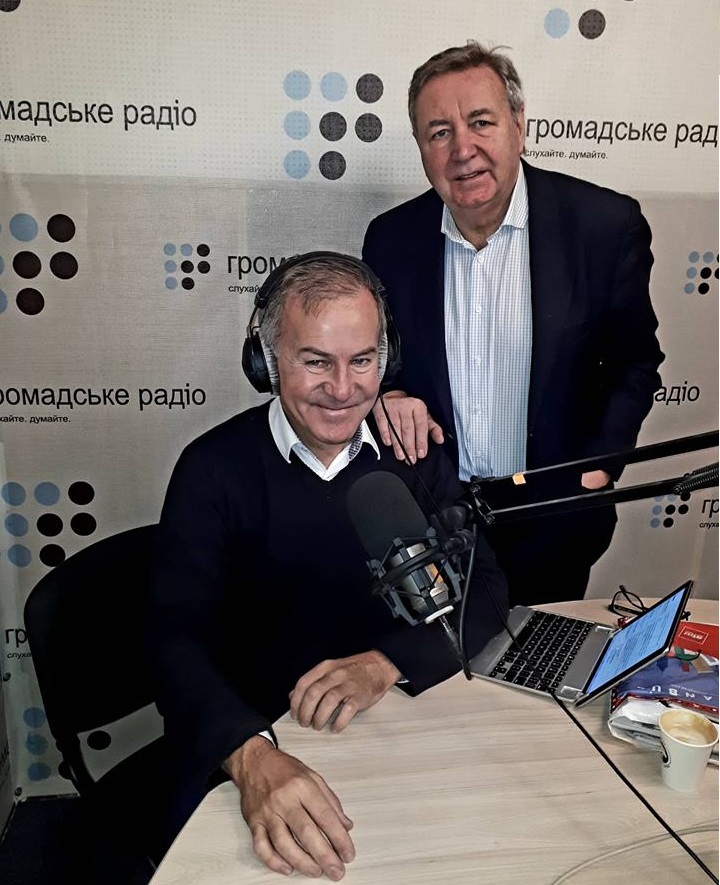
Bociurkiw: Well, funny you should say that, because in a few hours I’m going to this so-called UA TV, which is set up by the Ministry of Information. I didn’t even know it’s broadcasting. I haven’t seen it anywhere in Canada. But, apparently, they have satellite time, they’re translating into different languages as well. I think it’s way, way too late. I think the Ukrainian government and Ukrainian society should have got itself together –
Nahaylo: But where is the accountability? Do we know who are the target audiences? How many people actually listen? What are the carrots to dangle before the listeners to make it interesting? How are you competing against Russia Today with your very limited resources? We know nothing about that. On paper, it exists. But does it actually have an impact? Is the money justified?
Bociurkiw: Yes, it’s very frustrating. Again, last year at Tiger we had this panel that I moderated on nation-branding. And that was one of the big messages that came out of there. Ukraine is not getting its narrative out. And it’s not countering Russian propaganda. So, these types of international broadcasting outlets, if properly done, if properly resourced, could have a really big impact in terms of getting Ukraine’s message out.
Nahaylo: Thank you very much for that stimulating and wide-ranging discussion. I’ve been talking to Michael Bociurkiw, now I don’t hesitate to say, a distinguished and eminent global affairs analyst, and I hope to see you again very soon on our program.
Bociurkiw: Thank you for having me!
NEWS
Sanctions forever
EU leaders extended punishing economic sanctions against Russia over the conflict in Ukraine for another six months, amid heightened tensions over the Azov Sea clash. The EU President, Donald Tusk, tweeted from a summit in Brussels that the «EU unanimously prolongs economic sanctions against Russia given zero progress in implementation of Minsk agreements,». The sanctions target whole sectors of the Russian economy including its valuable oil businesses.
Assistance from Alliance
NATO will supply Ukraine’s military with secure communication equipment this month, NATO Secretary General Jens Stoltenberg told President Petro Poroshenko, who called to discuss an escalation of Kiev’s conflict with Moscow. This is part of a 40 million Euro ($46 million) pledge by the Western military alliance to strengthen Ukraine’s armed forces. Stoltenberg said the secure communications equipment would be delivered by the end of the year.
Threat from Russia
Russia has been ramping up its forces near the border with Ukraine since August and now poses the greatest military threat since 2014, the year Moscow annexed Crimea, the commander of Ukraine’s armed forces told Reuters in an interview. General Viktor Muzhenko provided a series of satellite images which he said showed the presence of Russian T-62 M tanks stationed 18 km (11 miles) from the Ukrainian border. They had more than doubled to 93 from 250 vehicles within the space of two weeks from mid-September to Oct 1.
No Trump-Putin meeting
There will be no meeting between U.S. President Donald Trump and Russian President Vladimir Putin while Russia still holds Ukrainian ships and sailors seized near Crimea, U.S. national security adviser John Bolton said. Russia seized three Ukrainian navy vessels and their combined crew of 24 last month off the coast of Russian-annexed Crimea and accused them of illegally entering Russian waters.
Ukrainian prisoners of war
Two Ukrainian navy captains being held in a Russian jail have refused to provide testimony because they consider themselves prisoners of war. Roman Mokryak, the commander of one of the gunboats, told Russian investigators he would not provide any information until his crew was released, his lawyer, Ilya Novikov, said. Oleh Melnychuk, the captain of the tugboat, has also refused to testify, denying Moscow’s accusations and calling himself a prisoner of war, according to his lawyer Edem Semedlyayev. No date has been set for the sailors’ trial.
Award for Sentsov
The European Parliament awarded Ukrainian filmmaker and political prisoner Oleg Sentsov the 2018 Sakharov Prize for Freedom of Thought on December 12. Sentsov’s cousin Nataliya Kaplan and his lawyer Dmitry Dinze traveled to Strasbourg, France, to accept the award on his behalf. Sentsov has been imprisoned in Russia’s Siberian Arctic since his arrest in 2014 for supposedly leading a terrorist organization in occupied Crimea.
Independent church before Christmas
Ukrainian priests will meet on December 15 for Sobor to work towards an independent church, following an Orthodox «schism», in what Kiev authorities hope will be a further step out of Russia’s orbit. The meeting will seek to implement a landmark decision by Istanbul-based Ecumenical Patriarch Bartholomew I to recognize Ukraine’s independence from the Russian Orthodox Church. The clergy will elect a Head of new united independent Ukrainian Church. New leader will receive the Tomos – a special document which officially recognizes the independence of the church – from the Ecumenical Patriarch in Istanbul on January 6, right on Orthodox Christmas Eve.
Another belt for Lomachenko
Vasyl Lomachenko defeated José Pedraza to unify his lightweight titles. The winner said afterwards that he would like to stay the course toward unification at 135lbs, calling out the undefeated Mikey Garcia by name while still in the ring. “Maybe next year, we can fight against Mikey Garcia,” he said. “One name, one belt.”
MUSIC
This week’s song is by a new Kyiv band called Cloudless. Their music was featured in Hromadske Radio’s new live music show Here and Now, we thought you’d enjoy it too!
LOOKING FORWARD
Next week we’ll be back with more commentary on events in Ukraine with interview host Marta Dyczok. We would be happy to receive any feedback from you. Write to us at: [email protected]. This is Oksana Smerechuk in Kyiv. Thanks so much for listening.
Interview transcribed by Marta Dyczok, Caitilin O’Hare, and Oksana Smerechuk. News by Ira Zolomko. Music by Andriy Izdryk. Sound engineer Andriy Izdryk. E-mail distribution Ilona Sviezhentseva. Web support by Kyrylo Loukerenko.
Hromadske Radio is facing a financial crunch and is appealing to listeners for support. Should you feel inclined to donate to keep this project going, please follow the link to the crowdfunding campaign.
